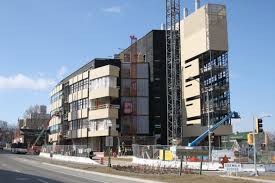 A standby takeout commitment is defined as a letter promising to deliver a takeout loan upon the proper completion of a commercial building. The terms of a standby takeout commitment are typically horrible - a very high interest rate, a big slug of points - just for issuing the letter, and another big slug of points if the loan ever funds. In truth, a standby loan is never expected to actually fund.
A standby takeout commitment is defined as a letter promising to deliver a takeout loan upon the proper completion of a commercial building. The terms of a standby takeout commitment are typically horrible - a very high interest rate, a big slug of points - just for issuing the letter, and another big slug of points if the loan ever funds. In truth, a standby loan is never expected to actually fund.
Whaaat? Why on earth would a developer want to pay a big slug of points for a mere letter promising to deliver an absolutely terrible loan? The reason why is because some construction lender is requiring a forward takeout commitment as a condition to funding its construction loan. A standy takeout commitment satisfies this requirement, and even though a standy takeout commitment letter is very expensive, it can often prove to be the key financial ingredient to finally getting the building built. I am going to give you an example in a moment that will make this whole issue clear.

"Gee, George, I am only half following you. What is a takeout loan again?" A takeout loan is just a permanent loan used to pay off a construction loan. You can use a permanent loan for lots of purposes. You can use a permanent loan to buy a commercial building. You can use a permanent loan to refinance your existing commercial property to pull out some equity. Who knows? You might want to pull out some cash to take your new girlfriend, Lola La Boom Boom, to Las Vegas. Or you can use a permanent loan to pay off the construction loan that you took out to build your new building. When you use the loan proceeds to pay off a construction loan, this special kind of permanent loan is called a takeout loan. Understand?
So do the loan documents actually say, "Takeout Loan"? Naw. The documents look exactly the same as any other permanent loan. There is a Promissory Note and a Mortgage. Takeout loans look like any other garden variety permanent loans. Hang in there guys. Don't nod off on me. An example is coming up that will bring everything together.
"Gee, George, I hope you don't think I'm stupid, but what's a permanent loan again?" A permanent loan is defined as a first mortgage on a commercial property, where there is a little bit of amortization (typically 20 or 25 years) and a term of at least five years. In plain English, a permanent loan is just a garden-variety commercial first mortgage, typically from a bank, a conduit, or a life company.
"Okay, George, I'm trying really hard to understand, but you keep using these big words, like forward takeout commitment." A forward takeout commitment is just a letter promising to deliver a takeout loan in the future. A commitment is just a letter. Forward takeout commitments are typically issued by life companies, and they usually have great terms. The developer actually plans to ask the life company to fund the loan. That being said, a standy takeout commitment is a form of forward takeout commitment.

An example will hopefully make all of these fancy terms clear. Once upon a time there was a developer named Doug. Doug wanted to build a multi-tenant industrial building on spec; i.e., without any pre-leasing. Doug was convinced that manufacturing in the U.S. was poised to go nuts and rents would go through the roof. If only he could bring a new industrial center online in less than one year, he could capture the ballistic demand for newer industrial space in his gateway city.
Doug goes to the bank and sits down with his construction lender. The conservative banker is not as bullish as Doug, and he tells Doug that the only way his construction loan will ever get approved is if Doug gets a forward takeout commitment from a bankable lender. A bankable lender is a commercial real estate lending company with a net worth large enough to stand behind their promise to fund a loan in the future.
Doug tracks down several life companies who are issuing forward takeout commitments, and he submits his takeout commitment request. All of them turn him down. "Doug, we just don't believe that industrial rents are going to soar from $3.60 per SF to $5.50 per SF within 12 months. We just don't believe it." By the way, commercial rents are customarily denominated on a per-year basis. Therefore $3.60 per SF means $0.30 per SF per month.
Doug keeps looking for a forward takeout commitment and eventually stumbles upon a bankable lender issuing standby takeout commitments. The terms are onerous. The lender wants two points just for the standby takeout commitment letter. If the standby loan ever funds, there is also an exit fee of one more point. Lastly, in a market where banks are making permanent loans at just 3.75%, the interest rate on the standby loan is a whopping 8%.
By the way, an exit fee is a fee owed when a loan pays off - regardless of whether you pay the loan off early, late, or exactly at maturity. It's like a prepayment penalty that you just can't escape.
Everyone tells Doug that he is nuts to pay for such a horrible standby takeout commitment, but when Doug sits down with his construction lender, the banker informs him that the letter will work. His spec construction loan funds, the industrial building gets built, industrial rents indeed do skyrocket as industrial vacancies in gateway cities fall below 2%, and Doug ends up with a ten-year lease from a near-credit tenant lessee. Once the lease is signed and this strong tenant moves in, Doug immediately sells the building to a REIT for almost twice what it cost him to build it. Everyone admits that Doug is a genius.
By the way, a credit tenant lease is a long-term lease to an investment grade company - a company with a credit rating from Standard and Poor's of BBB or better. A REIT is a real estate investment trust, sort of like a mutual fund that buys and operates commercial buildings.
The reason I am blogging on this subject is that I actually saw a standby takeout commitment today. I haven't seen a standby takeout commitment for at least 12 years. Most commercial construction lenders simply wrote uncovered or open-ended construction loans during the early 2000's (2000 - 2007). An uncovered construction loan and an open-ended construction loan are the same thing. The terms simply mean a commercial construction loan made with no forward takeout commitment in place. The construction lender is betting that the developer will be able to find a takeout loan on his own, once the building is built and leased. For most of the past 15 years, this has been a reasonable bet.
Do you need a commercial construction loan? Simply enter the deal into C-Loans.com. Our 750 participating banks are ravenous for commercial construction loan requests right now. This is why I have been blogging on the subject of commercial construction loans so much recently.
Do you find my teaching methods helpful? Wish you were a near-expert in commercial real estate finance? Because so MANY commercial loans are ballooning in the next three years, now is the best time to be a commercial mortgage broker in history!
Remember, if you ever meet a banker who is making commercial real estate loans, you can parlay his contact information into a free directory of 2,000 commercial real estate lenders.
If you convince a banker to join C-Loans as a lender, we'll send you for free the training course of your choice and pay you an additional $250 every time he closes a commercial loan for a C-Loans user. How do you convince a lender to join C-Loans? Just send him the web page that pops up when you click the red button below.
You can now place business loans - not just commercial real estate loans but also loans secured by equipment, inventory, and accounts receivable - using C-Loans.








